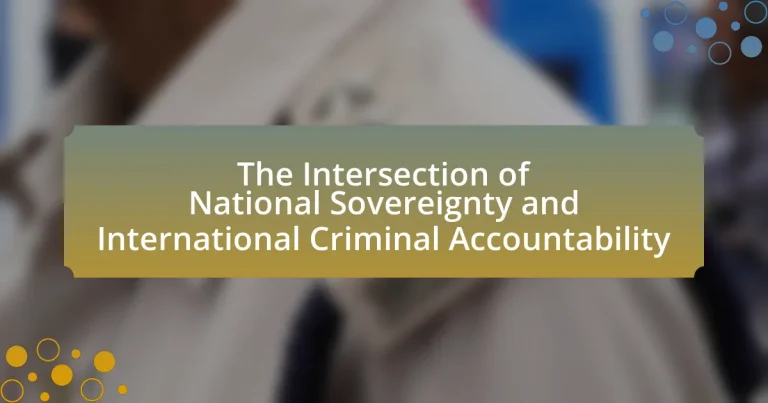The article examines the complex relationship between national sovereignty and international criminal accountability, highlighting the tension between a state’s right to self-governance and its obligations under international law to prosecute serious crimes such as genocide and war crimes. It discusses key principles of national sovereignty, including territorial integrity and political independence, alongside foundational concepts of international criminal accountability, such as individual criminal responsibility and universality of jurisdiction. The article also addresses the challenges that arise from this intersection, including legal conflicts and state justifications for non-compliance, while exploring pathways to enhance accountability through international cooperation and the strengthening of domestic legal systems. Ultimately, it emphasizes the importance of balancing state autonomy with the enforcement of global justice standards.

What is the Intersection of National Sovereignty and International Criminal Accountability?
The intersection of national sovereignty and international criminal accountability lies in the tension between a state’s right to govern itself and the obligation to adhere to international laws that address crimes such as genocide, war crimes, and crimes against humanity. National sovereignty grants states the authority to manage their internal affairs without external interference; however, international criminal accountability, as established by treaties like the Rome Statute of the International Criminal Court, mandates that states prosecute individuals for serious international crimes. This duality is evident in cases where national governments may resist international intervention, citing sovereignty, while the international community asserts the need for accountability to uphold human rights and justice. For instance, the principle of “universal jurisdiction” allows states to prosecute offenders regardless of where the crime occurred, challenging the traditional notion of sovereignty.
How do national sovereignty and international criminal accountability interact?
National sovereignty and international criminal accountability interact through a complex relationship where states retain the authority to govern themselves while also being subject to international laws that hold them accountable for crimes such as genocide, war crimes, and crimes against humanity. This interaction is exemplified by the establishment of the International Criminal Court (ICC), which operates under the principle of complementarity, meaning it can only prosecute cases when national courts are unwilling or unable to do so. For instance, the ICC’s involvement in cases from countries like Sudan and Libya illustrates how international accountability mechanisms can challenge national sovereignty when states fail to address serious crimes. Thus, while national sovereignty allows states to exercise control over their legal systems, it is increasingly constrained by international norms that seek to ensure justice for victims of egregious offenses.
What are the key principles of national sovereignty?
The key principles of national sovereignty include territorial integrity, political independence, and the right to self-determination. Territorial integrity asserts that a state has the exclusive right to govern its territory without external interference, as recognized in the United Nations Charter. Political independence emphasizes that a nation can make its own decisions and policies without external coercion, which is essential for maintaining its sovereignty. The right to self-determination allows nations to determine their political status and pursue their economic, social, and cultural development, a principle enshrined in international law, particularly in the International Covenant on Civil and Political Rights. These principles collectively reinforce the concept of national sovereignty in the context of international relations.
What are the foundational concepts of international criminal accountability?
The foundational concepts of international criminal accountability include individual criminal responsibility, the principle of legality, and the universality of jurisdiction. Individual criminal responsibility asserts that individuals, not states, can be held accountable for crimes such as genocide, war crimes, and crimes against humanity, as established by the Nuremberg Trials after World War II. The principle of legality, or nullum crimen sine lege, ensures that no one can be prosecuted for an act that was not defined as a crime at the time it was committed, which is a fundamental aspect of fair trial rights. Universality of jurisdiction allows states to prosecute individuals for serious international crimes regardless of where they were committed, reflecting a global consensus on the need to combat impunity. These concepts are enshrined in various international treaties and statutes, including the Rome Statute of the International Criminal Court, which further solidifies their importance in the framework of international law.
Why is the intersection of these concepts significant in global governance?
The intersection of national sovereignty and international criminal accountability is significant in global governance because it shapes the balance between state autonomy and the enforcement of international law. This balance is crucial for addressing transnational crimes, such as genocide and war crimes, which often require international cooperation for effective prosecution. For instance, the establishment of the International Criminal Court (ICC) exemplifies how international legal frameworks can hold individuals accountable, even when national governments may be unwilling or unable to act. This intersection promotes a global standard for justice, reinforcing the principle that sovereignty does not exempt states from accountability for egregious violations of human rights.
How does this intersection impact state behavior in international relations?
The intersection of national sovereignty and international criminal accountability significantly impacts state behavior in international relations by influencing how states prioritize their legal obligations versus their autonomy. States often face a dilemma between adhering to international norms, such as those established by the International Criminal Court, and maintaining their sovereignty, which can lead to resistance against external legal pressures. For instance, countries like Sudan and Libya have historically rejected international criminal charges against their leaders, asserting sovereignty as a defense against accountability measures. This tension can result in states either cooperating with international legal frameworks to enhance their legitimacy or resisting them to preserve their sovereign rights, ultimately shaping diplomatic relations and international cooperation.
What role do international treaties play in this context?
International treaties serve as binding agreements that establish legal frameworks for cooperation among nations regarding international criminal accountability. These treaties, such as the Rome Statute of the International Criminal Court, define crimes like genocide and war crimes, thereby facilitating prosecution and accountability on a global scale. They also create obligations for states to enact domestic laws that align with international standards, ensuring that national sovereignty does not impede the pursuit of justice for serious crimes. By ratifying these treaties, countries commit to uphold international norms, which reinforces the principle that sovereignty cannot be used as a shield against accountability for egregious violations of human rights.

What challenges arise at the intersection of national sovereignty and international criminal accountability?
Challenges at the intersection of national sovereignty and international criminal accountability include the tension between a state’s right to govern itself and the obligation to adhere to international law. States often resist external intervention in their judicial processes, arguing that it infringes on their sovereignty. For instance, the principle of non-interference can lead to a lack of cooperation with international tribunals, as seen in cases like Sudan’s refusal to surrender Omar al-Bashir to the International Criminal Court despite an arrest warrant. Additionally, differing interpretations of justice and accountability can create conflicts, as some nations prioritize national interests over international obligations, undermining efforts to prosecute war crimes and crimes against humanity effectively.
What are the main legal conflicts between national laws and international norms?
The main legal conflicts between national laws and international norms arise primarily from issues of sovereignty, jurisdiction, and compliance. National laws often prioritize domestic interests and legal frameworks, which can conflict with international norms that promote universal human rights and accountability. For instance, a country may enact laws that shield its officials from prosecution for crimes against humanity, directly opposing international treaties like the Rome Statute of the International Criminal Court, which mandates accountability for such crimes. Additionally, differing interpretations of legal obligations can lead to conflicts; for example, while international norms may require the protection of refugees, national laws may impose restrictions that violate these obligations. These conflicts highlight the tension between a state’s right to govern itself and the international community’s efforts to uphold global standards of justice and human rights.
How do states justify non-compliance with international criminal laws?
States justify non-compliance with international criminal laws primarily through the assertion of national sovereignty. They argue that adherence to these laws infringes upon their right to self-determination and governance. For instance, countries may claim that their legal systems are sufficient to address crimes without external intervention, citing examples like the United States’ refusal to ratify the Rome Statute of the International Criminal Court, which it argues undermines its judicial authority. Additionally, states often invoke political or security concerns, suggesting that compliance could destabilize their governments or compromise national interests, as seen in cases where regimes prioritize internal stability over international obligations.
What are the implications of these conflicts for victims of crimes?
Conflicts significantly impact victims of crimes by exacerbating their vulnerability and limiting access to justice. Victims often face increased trauma due to violence and instability, which can lead to long-term psychological and physical health issues. Furthermore, in situations where national sovereignty is prioritized over international accountability, victims may find themselves without legal recourse, as local judicial systems may be compromised or unwilling to prosecute offenders. For instance, a report by the International Criminal Court indicates that in regions experiencing conflict, only 10% of victims receive adequate support or compensation, highlighting the systemic failures in addressing their needs. This lack of accountability not only perpetuates a cycle of violence but also undermines the rule of law, leaving victims feeling isolated and powerless.
How do political considerations influence accountability measures?
Political considerations significantly influence accountability measures by shaping the willingness of states to cooperate with international legal frameworks. For instance, governments may prioritize national interests over international obligations, leading to selective enforcement of accountability measures. This is evident in cases where powerful nations avoid prosecution for war crimes due to their political leverage, as seen in the United States’ actions regarding the International Criminal Court. Furthermore, political alliances can affect the implementation of accountability measures, as countries may shield allies from scrutiny to maintain diplomatic relations. Such dynamics illustrate how political motivations can undermine the effectiveness of accountability mechanisms in the context of international criminal justice.
What examples illustrate the tension between sovereignty and accountability?
Examples illustrating the tension between sovereignty and accountability include the International Criminal Court’s (ICC) interventions in cases like Sudan and Libya. In Sudan, President Omar al-Bashir was indicted for war crimes, yet he refused to surrender, citing national sovereignty. This situation highlights the conflict between a state’s right to govern itself and the international community’s push for accountability for crimes against humanity. Similarly, in Libya, the ICC sought to hold leaders accountable for atrocities during the civil war, but the Libyan government’s assertion of sovereignty complicated the enforcement of these charges. These instances demonstrate how national sovereignty can obstruct international efforts to ensure accountability for serious crimes.

What are the pathways to enhancing accountability while respecting national sovereignty?
Enhancing accountability while respecting national sovereignty can be achieved through the establishment of international legal frameworks that promote cooperation without infringing on state autonomy. Mechanisms such as the International Criminal Court (ICC) exemplify this approach by allowing states to retain sovereignty while committing to prosecute serious crimes like genocide and war crimes. The principle of complementarity in the ICC’s framework ensures that national jurisdictions are prioritized, thus respecting sovereignty, while still holding states accountable for failing to act against egregious violations. Additionally, fostering bilateral and multilateral agreements for mutual legal assistance can facilitate accountability by enabling states to collaborate on investigations and prosecutions without compromising their sovereignty. These pathways demonstrate that accountability can be enhanced through cooperative frameworks that honor the principles of national sovereignty.
How can international cooperation be fostered in this area?
International cooperation in the area of national sovereignty and international criminal accountability can be fostered through the establishment of multilateral treaties and agreements that promote shared legal standards and mutual recognition of judicial decisions. For instance, the Rome Statute of the International Criminal Court (ICC) exemplifies how countries can collaborate to hold individuals accountable for crimes such as genocide and war crimes, thereby reinforcing a collective commitment to justice. Additionally, regular diplomatic dialogues and forums, such as the United Nations General Assembly, can facilitate discussions on best practices and challenges in enforcing international law, further enhancing cooperation among nations.
What role do international organizations play in mediating these issues?
International organizations play a crucial role in mediating issues related to national sovereignty and international criminal accountability by providing frameworks for cooperation, facilitating dialogue, and establishing legal standards. For instance, the International Criminal Court (ICC) enables states to hold individuals accountable for crimes such as genocide and war crimes, thereby promoting justice while respecting national sovereignty. Additionally, organizations like the United Nations (UN) offer platforms for negotiation and conflict resolution, which can help reconcile national interests with international legal obligations. The effectiveness of these organizations is evidenced by their involvement in various peacekeeping missions and tribunals, which have successfully addressed complex issues of accountability in post-conflict societies.
How can states balance their sovereignty with international obligations?
States can balance their sovereignty with international obligations by engaging in multilateral treaties and agreements that respect national interests while committing to global standards. For instance, the United Nations Charter emphasizes the importance of state sovereignty but also mandates cooperation on issues like human rights and security. This dual approach allows states to maintain their autonomy while fulfilling their responsibilities under international law, such as the Rome Statute, which established the International Criminal Court. By ratifying such treaties, states demonstrate their willingness to adhere to international norms without completely relinquishing their sovereign rights.
What best practices can be adopted to improve accountability?
To improve accountability, organizations and governments should implement transparent reporting mechanisms, establish clear roles and responsibilities, and foster a culture of open communication. Transparent reporting mechanisms, such as regular audits and public disclosures, ensure that actions and decisions are visible to stakeholders, thereby enhancing trust and accountability. Clear roles and responsibilities delineate who is accountable for specific actions, reducing ambiguity and promoting ownership of outcomes. Fostering a culture of open communication encourages individuals to voice concerns and report unethical behavior without fear of retaliation, which is essential for maintaining accountability. These practices are supported by research indicating that organizations with high transparency and clear accountability structures experience lower instances of misconduct and higher levels of stakeholder trust.
How can domestic legal systems be strengthened to support international norms?
Domestic legal systems can be strengthened to support international norms by incorporating international treaties and standards into national legislation. This integration ensures that domestic laws align with global human rights and criminal accountability frameworks, facilitating compliance with international obligations. For instance, countries that ratify the Rome Statute of the International Criminal Court are required to implement laws that enable prosecution of war crimes and crimes against humanity domestically. Additionally, establishing specialized courts or tribunals can enhance the capacity to address international crimes effectively. Evidence of this approach can be seen in countries like Germany, which has enacted laws allowing for the prosecution of international crimes committed abroad, thereby reinforcing their commitment to international legal standards.
What strategies can civil society employ to advocate for accountability?
Civil society can employ several strategies to advocate for accountability, including grassroots mobilization, legal advocacy, and public awareness campaigns. Grassroots mobilization involves organizing communities to demand transparency and accountability from government officials, which can lead to increased public pressure for reforms. Legal advocacy includes utilizing national and international legal frameworks to hold perpetrators accountable, such as filing lawsuits or engaging with international courts. Public awareness campaigns aim to educate citizens about their rights and the importance of accountability, often leveraging social media and traditional media to amplify their message. These strategies have been effective in various contexts, such as the role of civil society in the Arab Spring, where organized movements led to significant political changes and accountability demands.
What practical steps can states take to navigate this complex intersection?
States can navigate the complex intersection of national sovereignty and international criminal accountability by implementing comprehensive legal frameworks that align domestic laws with international standards. This includes ratifying and incorporating international treaties, such as the Rome Statute of the International Criminal Court, into national legislation, thereby ensuring that international crimes are prosecuted domestically.
Additionally, states should establish specialized units within their judicial systems to handle international crimes, providing training for law enforcement and judicial personnel on international law and human rights standards. Collaborative efforts with international organizations, such as the United Nations, can enhance capacity-building and technical assistance, facilitating better compliance with international obligations.
Furthermore, states can engage in multilateral dialogues to share best practices and develop common strategies for addressing challenges related to sovereignty and accountability. For instance, the Global Accountability Network promotes cooperation among states to strengthen accountability mechanisms. These steps collectively enhance a state’s ability to uphold its sovereignty while fulfilling its international responsibilities.


